Trump Teases U.S. Territorial Expansion: Canada, Panama, and Greenland Options

President-elect Donald Trump is teasing American expansion into Canada, the Panama Canal, and Greenland, suggesting potential moves that echo historical territorial ambitions. His comments have provoked mixed reactions from foreign leaders, highlighting a nationalist agenda that intertwines with trade discussions, particularly concerning tariffs and corporate interests.
President-elect Donald Trump is entertaining provocative ideas about American territorial expansion that could rival historic acquisitions such as the Louisiana Purchase and the purchase of Alaska. Recently, he suggested that the United States could absorb Canada as its 51st state, proposed reclaiming control of the Panama Canal, and reiterated his interest in purchasing Greenland, a Danish territory.
Trump’s comments have blurred the lines between serious policy aspirations and rhetoric designed to provoke media attention and engage his base. For instance, during remarks to conservative activists, he informed Panama that embracing lower fees for U.S. ships traveling through the canal would stave off potential actions from him regarding its ownership. Uniquely, Trump invoked notions similar to the 19th-century Manifest Destiny, signaling a desire for U.S. expansion abroad, countering his earlier campaign platform which advocated for a reduced international footprint.
Calling Greenland’s ownership an “absolute necessity” for “National Security and Freedom throughout the World,” Trump’s remarks highlight a nationalistic agenda consistent with his “America First” narrative. Furthermore, while outlining his plans to designate drug cartels as foreign terrorist organizations, he hinted at potential military operations within Mexico to combat illicit activities, risking tensions with America’s largest trading partner.
Trump’s transition team has not clarified whether his statements represent genuine ambitions or serve for other purposes. While his interest in the Panama Canal has not been a campaign focal point, advisors have suggested that concerns over U.S. businesses in Panama might have influenced his recent outspokenness. Representative Carlos Gimenez remarked on Fox Business, “I always take him seriously, even though they may sound a little bit out there. It’s a legitimate threat to Panama.”
Panama’s President, José Raúl Mulino, asserted the nation’s ownership of the canal is “not negotiable,” reminding Trump of the transfer conducted in 1999 under a treaty with the U.S. Similarly, the idea of acquiring Greenland has been met with firm dismissals from Danish officials, emphasizing the territory’s autonomy and rejecting the premise of sale.
Further commentary included a lighthearted jab at Canada that followed Trump’s suggestion to implement tariffs on goods from both Canada and Mexico. His recent social media activity indicates a continued playful approach towards Canadian Prime Minister Justin Trudeau, reinforcing his long-held strategy of negotiating through provocation. In the early stages of his transition, Trump’s comments suggest a blend of foreign policy ambitions and domestic economic concerns, albeit amid mixed reception and responses from the nations involved.
The article addresses President-elect Donald Trump’s recent provocative statements regarding potential U.S. territorial expansion into Canada, the Panama Canal, and Greenland. It outlines his rhetoric and the mixed reactions from the governments of the respective territories, highlighting the implications of such discussions for international relations and trade. The historical context of previous U.S. territorial acquisitions underlines the significance of these proposals.
In conclusion, President-elect Donald Trump’s remarks on territorial expansion reflect an intriguing blend of historical ambition and contemporary nationalism. His comments concerning Canada, the Panama Canal, and Greenland illustrate a potential shift in U.S. foreign policy approach. While these provocations may energize his political base, they also elicit substantial diplomatic responses from the affected nations, illustrating the complexities of international relations moving forward.
Original Source: www.cnn.com








